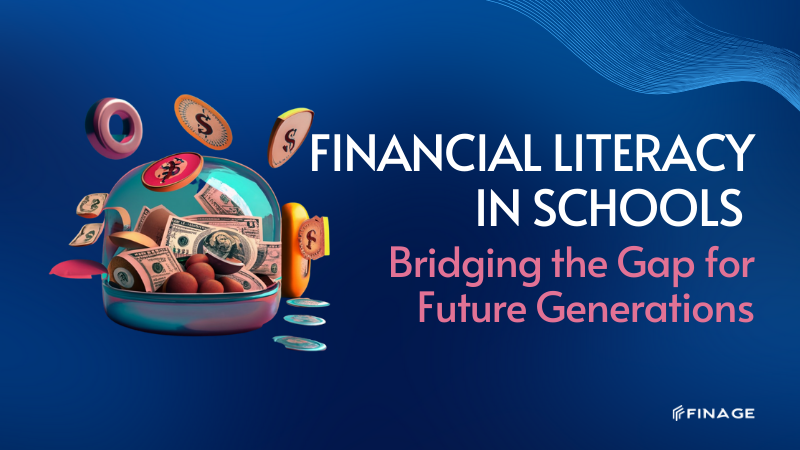Financial Literacy in Schools: Bridging the Gap for Future Generations
5 min read • June 26, 2023

Introduction
Table of Contents
- Introduction
- The Current State of Financial Literacy
- The Importance of Financial Literacy in Schools
- Empowering Future Generations
- Preventing Debt and Financial Mistakes
- Enhancing Economic Stability
- Fostering Independence
- Challenges in Implementing Financial Literacy Education
- Community and Parental Involvement
- The Road Ahead: Building Financially Savvy Generations
- Conclusion
Financial literacy is an essential life skill that every individual should possess. Yet, many young adults today graduate from high school without a basic understanding of personal finance. This knowledge gap often leads to poor financial decisions, mounting debt, and missed opportunities for future financial success. The solution to this problem lies in integrating financial literacy education into our school systems. In this blog, we'll explore the importance of financial literacy in schools and discuss why bridging the gap for future generations is crucial.
The Current State of Financial Literacy
Despite being a vital life skill, financial literacy education is often neglected in traditional school curriculums. Many young people enter adulthood without a solid understanding of fundamental financial concepts, such as budgeting, saving, investing, and managing debt. This lack of knowledge can lead to significant financial challenges and hardships later in life.
The Importance of Financial Literacy in Schools
Empowering Future Generations: Teaching financial literacy in schools empowers students to make informed and responsible financial decisions. It equips them with the tools they need to navigate complex financial landscapes and achieve their financial goals.
Preventing Debt and Financial Mistakes: Financial literacy education can help students avoid common financial pitfalls, such as excessive credit card debt, payday loans, and impulsive spending. By instilling good financial habits early, we can prevent future financial crises.
Enhancing Economic Stability: A population with a strong grasp of financial concepts is more likely to contribute to economic stability. Financially literate individuals are better equipped to manage their resources, invest wisely, and plan for their future, reducing the burden on social safety nets.
Fostering Independence: Financial literacy fosters independence and self-reliance. When students learn how to manage their money effectively, they are less likely to depend on others for financial support.
Challenges in Implementing Financial Literacy Education
While the benefits of teaching financial literacy in schools are evident, several challenges exist:
Curriculum Constraints: School curriculums are often crowded with mandatory subjects, leaving limited room for additional topics like financial literacy.
Teacher Training: Many educators lack the training and resources to effectively teach financial literacy.
Age-Appropriate Content: Designing age-appropriate financial literacy programs can be challenging, as the needs and understanding of a kindergartener differ from those of a high school senior.
Solutions to Bridging the Gap
Curriculum Integration: Schools can integrate financial literacy into existing subjects, such as math and social studies. This approach can make it easier to fit financial education into the school day.
Specialized Courses: Some schools offer elective courses in personal finance or partner with financial institutions to provide specialized training. These courses can delve deeper into financial topics and provide real-world applications.
Teacher Training: Invest in teacher training programs that equip educators with the knowledge and tools they need to teach financial literacy effectively.
Community and Parental Involvement: Encourage community organizations, banks, and parents to support financial literacy initiatives, helping to reinforce the importance of these skills both in and out of school.
The Road Ahead: Building Financially Savvy Generations
As we continue our journey towards a future where financial literacy is a fundamental skill for every student, several key strategies and considerations can help ensure the success of these initiatives:
Early Start: Financial literacy education should begin early in a child's education, starting as early as elementary school. Basic concepts of money, saving, and responsible spending can be introduced gradually.
Progressive Learning: The curriculum should be designed in a way that allows students to build on their financial knowledge as they progress through different grade levels. This means introducing more complex concepts and practical applications as they mature.
Real-World Applications: Emphasize real-life scenarios and practical exercises in financial literacy education. This hands-on approach can provide students with the skills they need to manage their finances effectively.
Technology Integration: Leverage technology and interactive tools to make financial literacy engaging and accessible. Mobile apps, online simulations, and interactive lessons can enhance the learning experience.
Parental Involvement: Encourage parents to take an active role in their children's financial education. Parents can reinforce the lessons learned in school and serve as role models for responsible financial behavior.
Collaboration with Financial Institutions: Partner with financial institutions and community organizations to provide resources, guest speakers, and educational programs. These partnerships can enrich the curriculum and expose students to various financial services and opportunities.
Assessment and Accountability: Implement assessments to measure students' financial knowledge and track their progress over time. Holding schools and educators accountable for teaching financial literacy is crucial for ensuring its integration into the curriculum.
Fostering an Entrepreneurial Mindset: Encourage students to think creatively, explore entrepreneurship, and understand the basics of starting and managing a business. This can instill an entrepreneurial spirit and financial resilience.
Peer Learning and Mentorship: Create opportunities for students to learn from their peers or from mentors in the community who have experience in managing their finances. Peer-led workshops and mentorship programs can be highly effective.
Continual Improvement: Continuously assess the financial literacy curriculum and adjust it to reflect changing economic circumstances and new financial products or technologies.
Final Thoughts
Financial literacy in schools is not just about teaching children how to balance a checkbook or invest in stocks. It's about equipping them with the skills and knowledge to make informed financial decisions throughout their lives. By bridging the gap and incorporating financial literacy into school education, we can empower future generations to secure their financial well-being, foster economic stability, and build a financially savvy society.
As we work together to prioritize financial education in schools, we're not just teaching kids about money; we're shaping a brighter, more financially secure future for everyone. The time to act is now, for the benefits of financial literacy education extend far beyond the classroom and into the very fabric of our society.
You can get your Real-Time and Historical Market Data with Finage free API key.
Build with us today!
Claim Your Free API Key Today
Access stock, forex and crypto market data with a free API key—no credit card required.

Stay Informed, Stay Ahead
Finage Blog: Data-Driven Insights & Ideas
Discover company news, announcements, updates, guides and more


